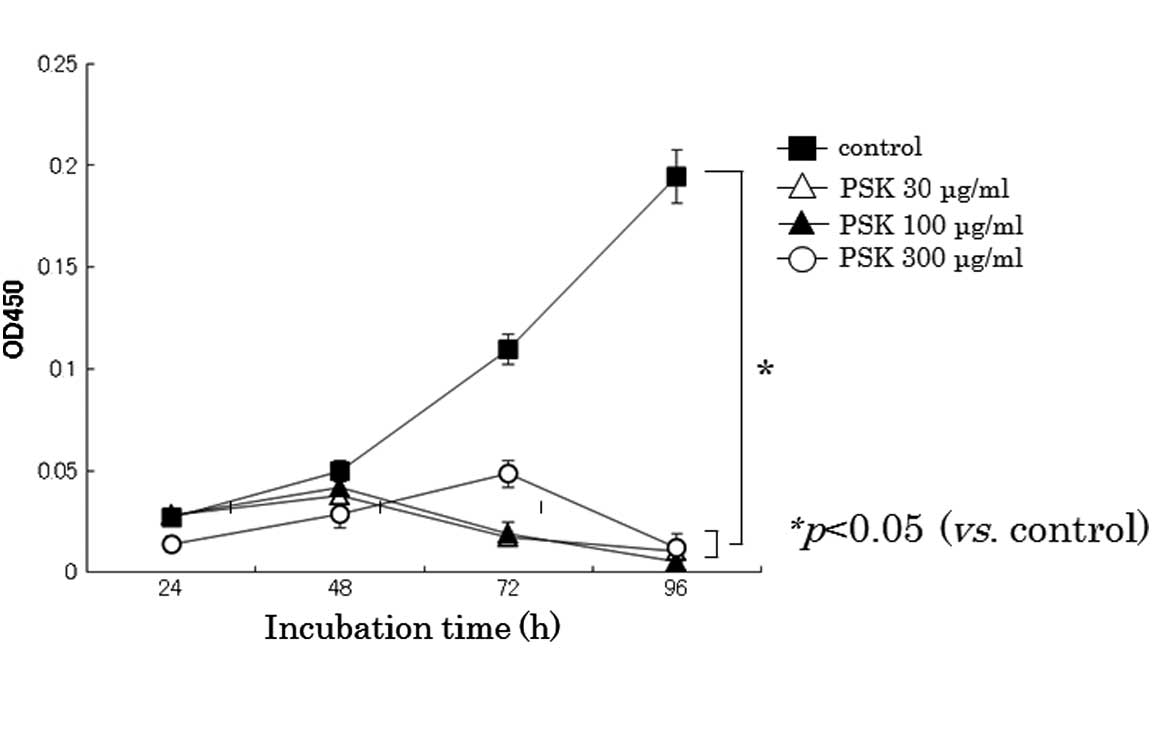|
1
|
Tsukagoshi S, Hashimoto Y, Fujii G,
Kobayashi H, Nomoto K and Orita K: Krestin (PSK). Cancer Treat Rev.
11:131–155. 1984. View Article : Google Scholar
|
|
2
|
Nakazato H, Koike A, Saji S, Ogawa N and
Sakamoto J: Efficacy of immunochemotherapy as adjuvant treatment
after curative resection of gastric cancer. Lancet. 343:1122–1126.
1994. View Article : Google Scholar : PubMed/NCBI
|
|
3
|
Ohwada S, Ikeya T, Yokomori T, et al:
Adjuvant immunochemotherapy with oral tegafur/uracil plus PSK in
patients with stage II or III colorectal cancer: a randomized
controlled study. Br J Cancer. 90:1003–1010. 2004. View Article : Google Scholar : PubMed/NCBI
|
|
4
|
Konno K, Motomiya M, Oizumi K, et al:
Effects of protein-bound polysaccharide preparation (PSK) in small
cell carcinoma of the lung. Haigan. 28:19–28. 1988. View Article : Google Scholar
|
|
5
|
Iguchi C, Nio Y, Takeda H, et al: Plant
polysaccharide PSK: cytostatic effects on growth and invasion;
modulating effect on the expression of HLA and adhesion molecules
on human gastric and colonic tumor cell surface. Anticancer Res.
21:1007–1013. 2001.
|
|
6
|
Hirahara N, Fujioka M, Edamatsu T, et al:
Protein-bound polysaccharide-K (PSK) induces apoptosis and inhibits
proliferation of promyelocytic leukemia HL-60 cells. Anticancer
Res. 31:2733–2738. 2011.PubMed/NCBI
|
|
7
|
Evan GI and Vousden KH: Proliferation,
cell cycle and apoptosis in cancer. Nature. 411:342–348. 2003.
View Article : Google Scholar : PubMed/NCBI
|
|
8
|
Hu W and Kavanagh JJ: Anticancer therapy
targeting the apoptosis pathway. Lancet Oncol. 4:721–729. 2003.
View Article : Google Scholar
|
|
9
|
Yefenof E, Gafanovitch I, Oron E, Bar M
and Klein E: Prophylactic intervention in
radiation-leukemia-virus-induced murine lymphoma by the biological
response modifier polysaccharide K. Cancer Immunol Immunother.
41:389–396. 1995. View Article : Google Scholar
|
|
10
|
Hattori ST, Komatsu N, Shichijo S and Itoh
K: Protein-bound polysaccharide K induced apoptosis of the human
Burkitt lymphoma cell line, Namalwa. Biomed Pharmacother.
58:226–230. 2004. View Article : Google Scholar : PubMed/NCBI
|
|
11
|
Jiménez-Medina E, Berruguilla E, Romero I,
et al: The immunomodulator PSK induces in vitro cytotoxic activity
in tumor cell lines via arrest of cell cycle and induction of
apoptosis. BMC Cancer. 8:782008.PubMed/NCBI
|
|
12
|
Thornberry NA: Caspases: key mediators of
apoptosis. Chem Biol. 5:R97–R103. 1998. View Article : Google Scholar : PubMed/NCBI
|
|
13
|
Chen X, Lan X, Mo S, et al: p38 and ERK,
but not JNK, are involved in copper-induced apoptosis in cultured
cerebellar granule neurons. Biochem Res Commun. 379:944–948. 2009.
View Article : Google Scholar : PubMed/NCBI
|
|
14
|
Reuter S, Eifes S, Dicato M, Aggarwal BB
and Diederich M: Modulation of anti-apoptotic and survival pathways
by curcumin as a strategy to induce apoptosis in cancer cells.
Biochem Pharmacol. 76:1340–1351. 2008. View Article : Google Scholar : PubMed/NCBI
|
|
15
|
Cory S and Adams JM: The Bcl-2 family:
regulators of the cellular life-or-death switch. Nat Res Cancer.
2:647–656. 2002. View
Article : Google Scholar : PubMed/NCBI
|
|
16
|
Leibowitz B and Yu J: Mitochondrial
signaling in cell death via the Bcl-2 family. Cancer Biol Ther.
9:417–422. 2010. View Article : Google Scholar : PubMed/NCBI
|
|
17
|
Xiao G, Fang H, Xing C and Xu W:
Structure, function and inhibition of Bcl-2 family proteins: a new
target for anti-tumor agents. Mini Rev Med Chem. 9:1596–1604. 2009.
View Article : Google Scholar : PubMed/NCBI
|
|
18
|
Ahn YH, Jung JM and Hong SH:
8-chloro-cyclic AMP-induced growth inhibition and apoptosis is
mediated by p38 mitogen-activated protein kinase activation in HL60
cells. Cancer Res. 65:4896–4901. 2005. View Article : Google Scholar
|
|
19
|
Park SJ and Kim IS: The role of p38 MAPK
activation in auranofin-induced apoptosis of human promyelocytic
leukemia HL-60 cells. Br J Pharmacol. 146:506–513. 2005. View Article : Google Scholar : PubMed/NCBI
|
|
20
|
Torcia M, De Chiara G, Nencioni L, et al:
Nerve growth factor inhibits apoptosis in memory B lymphocytes via
inactivation of p38 MAPK, prevention of BCL-2 phosphorylation, and
cytochrome release. J Biol Chem. 276:39027–39036. 2001. View Article : Google Scholar : PubMed/NCBI
|
|
21
|
De Chiara G, Marcocci ME, Torcia M, et al:
BCL-2 phosphorylation by p38 MAPK. J Biol Chem. 281:21353–21361.
2006.
|
|
22
|
Riedl SJ and Salvesen GS: The apoptosome:
signalling platform of cell death. Nat Rev Mol Cell Biol.
8:405–413. 2007. View
Article : Google Scholar : PubMed/NCBI
|
|
23
|
Garcia A, Morales P, Arranz N, Delgado ME,
Rafter J and Haza AI: Antiapoptotic effects of dietary antioxidants
towards N-nitrosopiperidine and N-nitrosodibutylamine-induced
apoptosis in HL-60 and HepG2 cells. J Appl Toxicol. 29:403–413.
2009. View
Article : Google Scholar : PubMed/NCBI
|
|
24
|
Zhang R, Humphreys I, Sahu RP, Shi Y and
Srivastava SK: In vitro and in vivo induction of apoptosis by
capsaicin in pancreatic cancer cells is mediated through ROS
generation and mitochondrial death pathway. Apoptosis.
13:1465–1478. 2008. View Article : Google Scholar : PubMed/NCBI
|






















